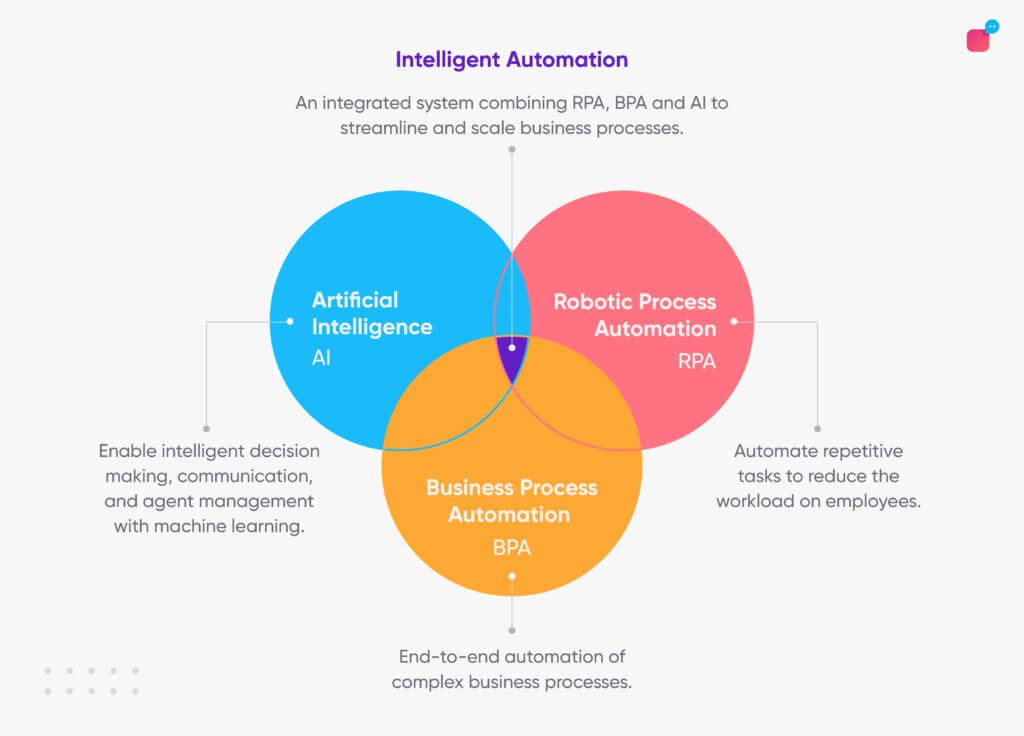The Impact of Intelligent Automation on Digital Transformation

The Impact of Intelligent Automation on Digital Transformation
Intelligent automation revolutionises digital transformation by streamlining operations and increasing efficiency across sectors. Organisations can automate monotonous work by combining artificial intelligence, machine learning, and robotic process automation, freeing employees to focus on higher-value activities. This breakthrough technology speeds up decision-making and enhances accuracy & customer experience.

According to the Capgemini survey, on average, more than one-third (35%) of financial services organisations have experienced a 2-5 percent improvement in top line growth as a result of automation. Businesses can achieve a competitive advantage in the digital landscape by using intelligent automation to react to changing market demands, create innovation, and stay ahead of the competition.
What is Intelligent Automation?
Intelligent automation leverages automation technologies to optimise processes at every level of the organisation. Simplicity is complexity resolved. This is exactly what an intelligent automation network aims to achieve. It simplifies processes and helps streamline resource allocation and deployment.
When various autonomous systems are designed to integrate and work with each other to seamlessly automate mundane tasks at scale, we’re left with intelligent automation.
Businesses can build a more sustainable process framework by combining the capabilities of automation technologies – business process automation (BPA), robotic process automation (RPA) and avant-garde technologies like AI, ML, NLP and process mining. This can help automate tedious, monotonous, replicable, non-specialised tasks.
Intelligent automation has applications in virtually every industry. They can drastically improve the functioning and efficiency of an organisation. This article explores how intelligent automation provides value in customer support and how exactly it works, allowing you to make a more informed choice for your organisation.
What is Digital Transformation?
Digital transformation is the process of using digital technologies to transform existing traditional and non-digital business processes and services or to create new ones to meet changing market and customer expectations, thereby completely changing how businesses are managed and operated, as well as how value is delivered to customers.
Why are Businesses Undergoing Digital Transformation?
There are numerous solutions to the critical question of why firms are undergoing digital transformations. The advantages of digital transformations surpass any trepidation to make the switch. Multiple arguments exist for working from home, ranging from greater productivity to excellent customer service. However, the top advantages of firms undergoing digital transitions are:
1. To Better Serve Their Clients or Customers:
Customers’ purchasing options are no longer limited. They have various options for satisfying their demands. The company that makes the purchasing process the easiest earns their business. A company that can do so consistently while giving the finest possible customer experience earns their loyalty. That can mean the difference between a thriving firm and one struggling to stay afloat. Successful digital transitions are a great approach to giving clients superior service and attention.
2. To Increase Brand Awareness Through Digital Presence:
Businesses are undergoing digital transformation to raise brand awareness with a solid digital presence. Companies can reach a larger audience, communicate with customers more effectively, and increase brand recognition by utilising internet platforms, social media, and digital marketing tactics. This move improves visibility and helps organisations remain competitive in an increasingly digital market.
3. To Adapt to a Changing Business Environment:
Businesses are undergoing digital transformation to keep up with a fast-changing business environment. Consumer expectations and market dynamics change as technology advances, necessitating greater agility and responsiveness for businesses. Businesses may stay competitive by incorporating digital tools and processes that streamline operations and improve consumer experiences. This adaptability is critical to long-term success and growth in today’s industry.
Also read: What role does Generative AI Play a Role in Customer Service?
How do intelligent automation technologies work?
Intelligent automation has three distinct components that perform different functions.
1. Business Process Automation and Management (BPA and BPM)
BPA or Business Process Automation is the first of the three components that organisations use to automate complex business transactions involving multiple steps. These solutions are usually tailor-made to suit specific operations.
Let’s understand this with an example. We know the customer support process is tedious. A lot of human labour is involved in sorting queries, assigning them to support representatives and responding to emails. It’s a complex and multi-layered task. BPA allows you to simplify and speed up this process by automating as many tasks as possible, such as auto ticket generation, smart routing of tickets, autoresponder for emails, chatbots, etc.
BPA solutions unify your employees, information, systems, and applications for lesser siloed data and better inter-departmental collaboration.
Business process management (BPM) on the other hand is an ongoing process of automation refinement. In BPM, organisations use a set of strategies to optimise and streamline manual as well as automated processes. While BPA focuses on maximising the efficiency of specific processes, BPM looks at automating the organisation at large.
Using BPM and BPA in conjunction is a promising strategy that lets stakeholders improve specific processes without losing the vision of the entire organisation. The BPM lays a framework for the automation of all processes in the organisation. Within this framework, BPA can monitor and analyse the performance of individual processes.
2. Robotic Process Automation (RPA)
RPA or Robotic Process Automation is used to automate high-volume, low-complexity tasks such as data entry or support queries. Industry leaders across sectors are implementing RPA in some form today. While BPA aims at automating and streamlining business processes from start to end, RPA is more focused on specific tasks at hand.
For instance, a customer logs onto the support portal of an e-commerce website to be greeted by a chatbot that can answer simple questions such as providing tracking links, updating orders and other basic functionality. General support queries that are received in high volumes are usually automated with RPA processes.
RPA software is designed to mimic human actions to solve rule-based problems. These problems do not require human intuition or autonomous decision-making ability and can be performed by the software by running the same commands fed to it initially.
3. Artificial Intelligence (AI)
The concept of intelligent automation is not new. However, the advent of modern artificial intelligence ushered in a paradigm shift for organisations looking to benefit from intelligent automation. The technology leverages machine learning algorithms and neural networks to make intelligent decisions. It can identify and decipher patterns, make projections and much more! It does all this using a training set of structured and unstructured data.
What makes artificial intelligence such a game-changer is its ability to improve over time with no additional programming required. This self-improving ability means every subsequent response from the AI is more accurate.
These three components need to be connected to create an intelligent ecosystem that is capable of exchanging information within itself. Conversational AI is built on top of this ecosystem. Conversational AI extends the intelligent automation capabilities by using NLP, NLU and sentiment analysis to have conversations with the end user. By adding the conversation AI factor, companies can elevate their user experiences and improve engagement.
Examples of Intelligent Automation
Intelligent automation systems manifest themselves in many ways. It is a way to automate every business opportunity intelligently. Let’s take a look at the different roles intelligent automation plays.
1. FAQ Support Automation
Intelligent automation can be used to manage high-support ticket volumes by autonomously answering questions that are most frequently asked and only transferring complex support tickets to live agents. The conversational platform such as a chatbot or voicebot will collect user information, the AI will understand their intent and fetch the right information with the help of RPA. This alleviates bottlenecks in the resolution rate and facilitates faster, more satisfactory responses.
2. Intelligent routing
Routing refers to the process where a live agent is assigned to a support ticket. Intelligent routing takes that a step further by analysing specifics about the caller such as where they are calling from, which language they are speaking and what type of query they have to automatically route the call (or chat) to the agent who is best equipped to resolve that query
3. Data migration
Businesses with large IT infrastructure often migrate their data to new storage locations within their data centres. This involves selecting, preparing, transforming and transferring large amounts of data. Intelligent automation technologies help achieve this with a high degree of reliability and consistency, leaving no room for human error.
4. Unified Customer Profile (UCP)
A UCP provides a holistic view of all the data an organisation has on a user such as name, email, phone number and location. Intelligent automation can help automate the collection and curation of this data. This helps businesses keep their customers engaged with relevant promos and information. While resolving queries for users, agents can view this profile to provide a contextual and more personalised engagement.
5. Procure to Pay (P2P)/ Source to Pay (S2P)
Intelligent automation framework can aid various procurement and sourcing-related processes such as requisitioning, purchasing, receiving, and accounting. Traditional P2P processes involve a lot of repetitive and time-consuming tasks, such as vendor evaluation, sections, invoice and payment data extraction, etc. And all these tasks involve multiple sources and systems. By integrating these systems and automating these tasks, companies can reduce (or even eliminate) manual effort and human error. At the same time, they can improve process efficiency and cost-effectiveness.
6. Customer onboarding
Collecting and compiling customer data safely and securely during the customer onboarding process can be very inefficient and a lengthy process when done manually at scale. Intelligent automation addresses this problem. For example, with RPA, companies can auto-fill forms for their customers or capture customer information from the documents they submitted. Another example would be automating communication such as sending welcome emails when a customer signs up. Conversational AI onboards users on their mobile with help of chatbots. Intelligent automation reduces manual tasks and speeds up the onboarding process.
7. KYC compliance
KYC regulations require organisations to collect large amounts of personal data from customers. This data can be in various formats such as digital and physical documents, biometric data and much more. IA can efficiently collect, store and process this data without human intervention. It also helps in data validation, which is a vital tool for fraud detection too. For example, with the help of conversational AI, companies can collect customer documents such as bank transactions, photo ID proofs, etc. RPA and AI can then scan through these documents to sort and filter them to identify high-risk transactions or duplicate ID proofs, etc. Intelligent automation streamlines KYC to reduce errors and speed up the process.
Suggested reading: How conversational AI in KYC improves verification process?
Industry-specific examples of intelligent automation
Let’s look at some examples of intelligent automation in top industries.
1. Intelligent automation in retail
Retail and eCommerce stores have many repetitive operational tasks related to product launches and sales. According to IBM, around 40% of retail and consumer product businesses use intelligent automation. Intelligent automation can level up the efficiency of retail stores in many different ways.
-
Inventory management
Some of the challenges faced in inventory management are miscalculation of demand, deadstock, misplaced stock and related customer service issues. These retail processes can be laborious when done manually, but intelligent automation can help optimise many back-end inventory processes.
It can give you insight into the optimum quantity of inventory to be ordered, warehouse real estate optimisation, and ensuring timely deliveries.
-
Sales analytics
Identifying patterns and customer demand is essential to thriving in the retail industry. Intelligent automation can help your organisation analyse sales patterns, and popular picks, and make intelligent decisions based on data.
-
Returns and refunds
It’s a harsh truth but a lot of people return products and this process is tiresome. Your staff needs to match the returns order with the original order, calculate the refund price, and share pick up details with the customer. All this can be automated and optimised for an error-free and quick process.
-
Customer communication
All customer communication involving new orders, welcome emails, order updates etc. can be sent with intelligent automation. Based on specific trigger actions, your customers can get timely notifications and information regarding their orders and your company updates.
Take a look at: Conversational Commerce: Complete Guide For Beginners
2. Intelligent automation in healthcare
PwC estimates that the healthcare industry processes 30 billion transactions annually, which adds up to a cost of $250 billion. The huge expenses can be attributed to the expensive manual labour that the industry uses in various processes such as clinical workflows. Doctors, nurses and other medical professionals save precious time by delegating repetitive tasks to intelligent automation so they can focus on attending to patients.
However, the healthcare industry is warming up to the benefits of intelligent automation. Some examples include:
-
Patient care with up-to-date data
Healthcare organisations like hospitals have several departments within them that might need to share patient data. Intelligent automation saves valuable time and resources by autonomously collecting data from patients and sending them to relevant departments.
-
Scheduling appointments
Hospital staff end up spending more time giving doctor appointments to patients than caring for patients on-premise. With RPA tools, patients can auto-schedule appointments. This way, the staff’s time frees up to take care of patients in-person.
3. Intelligent automation in financial services and banking
The banking sector deals with extremely large amounts of sensitive financial data that need to be handled with care. The nature of financial data is such that there is no room for error or complacency. Financial institutions have a robust protocol for data handling that protects users’ data from falling into the wrong hands.
-
Fraud detection
The RBI reported a total of 7400 bank fraud cases in the financial year 2021 in India. With digital payments taking the forefront and cybercrime on the rise, banking institutions must invest in fraud detection technologies to stay protected.
Intelligent automation can help protect against both internal and external fraud by flagging transactions as suspicious if it meets certain parameters. These flagged transactions can then be verified by a human agent. Banks across the world are adopting anti-fraud methodologies involving intelligent automation.
One great way to do this is to use an AI verification protocol that identifies the location of the transaction, the amount, tracking cookies and shopping behaviour. Post-compilation of these metrics, it either approves the transaction or flags it for manual review.
The algorithm can process thousands of transactions every second, making it a robust real-time defence system against fraud.
-
Loan processing
As with any document processing task, this too is time-consuming and tedious. By applying simple RPA rules and logic, you can automate a few of the manual tasks and free up resources to focus on more complex tasks. Tasks such as collecting customer documents, validating information, asking customers to fix incorrect entries, sending loan approval confirmations, etc. can be automated with an intelligent automation engine.
-
Account opening and closures
Opening and closing a bank account is a lengthy process. There are too many steps involved. And with manual document collection for KYC, verification of information and onboarding of users for the new services, there is a high chance of error and hence, more delays. Similarly, during account closure, banking staff need to cancel the user’s debit and credit cards, standing orders, transfer pending interests/funds, etc. With intelligent automation, banks have freed up their staff from these activities and let automation and AI take it over. Now, these same tasks are optimised for speed, accuracy and efficiency.
You would also love to know: Conversational Banking is the intelligent new-gen way to bank
4. Intelligent automation in insurance
The insurance industry handles tons of paperwork every day. Most of this work is done manually considering that it requires a great deal of precision. However, this comes at the risk of an error rate of 10%, which causes unnecessary rework and expenditure.
Just checking the status of a single claim can take a human a few minutes. The same can be done by intelligent automation in a matter of split seconds.
It’s easy to see why IA is the first choice for insurance companies when you consider the hundreds of thousands of claims they process.
With intelligent automation, insurance companies can save as much as 30% of claim processing costs.
-
Claims processing
Claims processing needs to be quick and accurate as customers claim insurance at the time of mishaps. Doing it manually and at scale is time-consuming and slow. It involves collecting customer information in different formats, analysing this information, cross-checking with terms and conditions, and verifying the claim. These steps could be biassed too leading to losses for either the company or the customer. With the help of Intelligent automation, most of these tasks can be automated for efficiency and accuracy.
-
Responding to queries
Customer support is part of all industries. In Insurance, queries come in from customers as well as independent brokers who sell their services. And to maximise sales, these queries need to be answered instantly. With self-service tools such as chatbots and voice bots, a majority of these queries can be answered with the help of AI and automation. As for the remaining queries, the AI uses smart routing to allocate the chat to an agent skilled (and available) to answer it.
Insurance chatbots are making life easier for insurers and policyholders.
5. Intelligent automation in the supply chain
The supply chain is at the heart of virtually every other industry. The global supply chain is the backbone on which all goods and services rely. A fault in the supply chain could cripple entire economies.
Supply chain management is a complex process in which large amounts of data relating to package details, optimum shipping routes and transport documentation are parsed around the clock. To perform these tasks, data must be collected and organised into databases that further interact with other applications.
Several shipping companies today use intelligent automation strategies to ensure fast and reliable delivery schedules. The process starts with sorting packages based on their volumetric weight, warehouse availability, destination and shipping route. The algorithm is designed to store data in a shared database, allowing every stakeholder in the process to be updated in real-time about the status of the package. This allows warehouse and dispatch teams to coordinate seamlessly and be more efficient.
Benefits of intelligent automation: Why is intelligent automation important?
A complete front to backend streamlining of operations is what makes intelligent automation a favourable investment by most businesses today. From automating mundane tasks to insight-based decisions, intelligent automation tools generate high ROI and reap many benefits for businesses.
1. Remarkable operational cost reduction
Intelligent automation works by automating processes and making them smarter. It helps reduce base costs by reducing human effort, avoiding new hiring and training costs, costs saved by reducing human errors, etc. Robotic process automation alone has the potential to reduce your business costs by up to 75%. Even if you are investing in AI (usually a one-time investment), intelligent automation can cut business process costs by up to 40% on average. In the long run, this allows for better resource allocation, more financially-sound strategic decisions, and a better ability to quickly scale up.
2. Less human error, improved accuracy
It’s only human nature for people to make mistakes. Performing certain repetitive tasks over and over again leaves plenty of room for unintentional errors to creep in once in a while. More often than not, these mistakes rain down heavy on your pocket and your client’s. This may even adversely impact your revenue flow since you increase your chances of losing clientele if the errors cause a considerable financial loss.
IA reduces the risk of that happening to sub-zero. Since RPA and BPA are designed and trained to follow a standardised workflow, you are able to produce consistent quality of results, every time.
3. Happy employees lead to happier customers
Unlike robots and as human beings, we crave change every once in a while. Your support agents expect to work on more fulfilling tasks. Outdated business processes bar them from doing just that. While this may seem like a minute issue to fix, dissatisfied agents lead to higher attrition rates, bad employee reviews, and an overall worse market standing.
Intelligent automation not only reaps you favourable results in terms of operational numbers but also saves you a buck by simply building a happier employee ecosystem. Now, your agents are able to dedicate their skillset (and scale upon it) to more challenging, complex tasks that truly require their attention.
4. Faster response to market shifts
Whether it’s a change in consumer behaviour or a fluctuation in the supply chain, intelligent automation shows you why it is truly intelligent. Putting unstructured data into actionable insights is another reason why you need to invest in intelligent automation tools today.
It’s like when animals like elephants and birds work as early warning systems by displaying unusual movements before an impending earthquake – your automation tool sort of works the same way. With predictive analysis from data collated over time, intelligent automation tools are able to detect patterns and raise a red flag when needed – giving you plenty of time to adapt to the market changes well before they happen.
5. Contextuality at the forefront
Multiple integration capabilities with intelligent automation bring better operational efficiency because it reduces the need for manual scavenging of information. Whether it is interdepartmental data transfers or client-end interactions, various connected systems work in synergy to ensure contextual, up-to-minute information exchange at every level of the organisation and customer lifecycle.
6. Rapid Scalability
Intelligent automation solutions provide flexibility and scalability to meet changing business requirements. Scalability ensures that businesses can efficiently manage larger volumes of work without requiring considerable manual intervention and resource allocation.
7. Increased Productivity
Intelligent automation enabled processes are more efficient and can be deployed 24 hours a day. Intelligent automation frees staff to focus on more value-driven, challenging, and creative responsibilities aligning with the organisation’s goals.
Intelligent automation: Need of the hour
Smart automation or intelligent automation is revolutionising digital transformation by reducing operations, increasing efficiency, and fostering industry-wide innovation. AI-powered solutions enable businesses to automate repetitive operations, remove errors, and improve decision-making, resulting in considerable cost savings and productivity increases. This technology breakthrough promotes agility and reactivity, allowing businesses to adjust to market changes and client expectations quickly.
Verloop.io leverages this potential to provide advanced customer support automation solutions, preparing businesses for long-term growth and competitive advantage in the digital age.
FAQs on intelligent automation
1. What is the main purpose of IPA?
The main purpose of Intelligent Process Automation (IPA) is to streamline business processes using technologies like BPA, RPA, and AI at the client-facing front-end as well as improve efficiency at an operational level in an organisation.
2. Who can contribute to achieving intelligent automation in an organisation
Implementation of IA needs to be a company-wide digital change. It requires support and contribution from your internal stakeholders (your employees) to adopt and implement it in different departments and your external stakeholders (customers) who should be able to quickly comprehend, get used to and leverage its capabilities.
3. Does intelligent automation provide knowledge representation?
AI is a knowledge-based system. Since intelligent automation is a step ahead of script-based automation, a robust AI is able to infer datasets and apply them in practical scenarios. It is a continuously evolving technology that only grows more sophisticated as it is trained with appropriate knowledge representation techniques.
4. How can you identify an intelligent automation opportunity?
Intelligent automation is sought after to bring efficiency to business processes. A few ways you can identify if you need automation is by auditing your current processes. Anything that is repetitive, in large volumes, and can be standardised is more likely an opportunity. Other factors that are telling include high manual overhead, frequent human errors, stability and standardisation of processes. Artificial intelligence can go a step ahead and automate tasks that are complex and time-consuming.
5. Intelligent automation vs RPA – What’s the difference?
The main difference between intelligent automation and robotic process automation (RPA) is that while RPA is used to automate repetitive rule-based specific tasks, intelligent automation is a holistic solution that aims at end-to-end streamlining of business processes with AI logic and data-driven decisions. Intelligent automation is not entirely rule-based as artificial intelligence along with RPA and BPA aims at handling more complex, insight-driven tasks.
6. Intelligent automation vs Artificial intelligence – What’s the difference?
The main difference between intelligent automation and artificial intelligence is that AI is a subset of intelligent automation – IA is a complete automation solution involving RPA and BPA as well. While AI is smart and intuitive, intelligent automation also takes into account automating mundane, repetitive, high-volume tasks.







